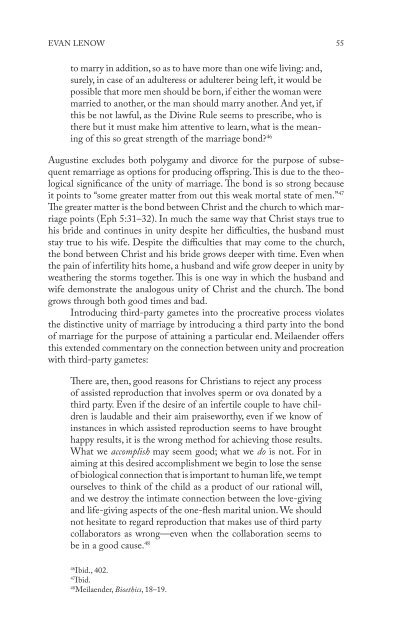experienced praying donating
SWJT%2059.1_Lenow
SWJT%2059.1_Lenow
Create successful ePaper yourself
Turn your PDF publications into a flip-book with our unique Google optimized e-Paper software.
EVAN LENOW 55<br />
to marry in addition, so as to have more than one wife living: and,<br />
surely, in case of an adulteress or adulterer being left, it would be<br />
possible that more men should be born, if either the woman were<br />
married to another, or the man should marry another. And yet, if<br />
this be not lawful, as the Divine Rule seems to prescribe, who is<br />
there but it must make him attentive to learn, what is the meaning<br />
of this so great strength of the marriage bond? 46<br />
Augustine excludes both polygamy and divorce for the purpose of subsequent<br />
remarriage as options for producing offspring. This is due to the theological<br />
significance of the unity of marriage. The bond is so strong because<br />
it points to “some greater matter from out this weak mortal state of men.” 47<br />
The greater matter is the bond between Christ and the church to which marriage<br />
points (Eph 5:31–32). In much the same way that Christ stays true to<br />
his bride and continues in unity despite her difficulties, the husband must<br />
stay true to his wife. Despite the difficulties that may come to the church,<br />
the bond between Christ and his bride grows deeper with time. Even when<br />
the pain of infertility hits home, a husband and wife grow deeper in unity by<br />
weathering the storms together. This is one way in which the husband and<br />
wife demonstrate the analogous unity of Christ and the church. The bond<br />
grows through both good times and bad.<br />
Introducing third-party gametes into the procreative process violates<br />
the distinctive unity of marriage by introducing a third party into the bond<br />
of marriage for the purpose of attaining a particular end. Meilaender offers<br />
this extended commentary on the connection between unity and procreation<br />
with third-party gametes:<br />
There are, then, good reasons for Christians to reject any process<br />
of assisted reproduction that involves sperm or ova donated by a<br />
third party. Even if the desire of an infertile couple to have children<br />
is laudable and their aim praiseworthy, even if we know of<br />
instances in which assisted reproduction seems to have brought<br />
happy results, it is the wrong method for achieving those results.<br />
What we accomplish may seem good; what we do is not. For in<br />
aiming at this desired accomplishment we begin to lose the sense<br />
of biological connection that is important to human life, we tempt<br />
ourselves to think of the child as a product of our rational will,<br />
and we destroy the intimate connection between the love-giving<br />
and life-giving aspects of the one-flesh marital union. We should<br />
not hesitate to regard reproduction that makes use of third party<br />
collaborators as wrong—even when the collaboration seems to<br />
be in a good cause. 48<br />
46<br />
Ibid., 402.<br />
47<br />
Ibid.<br />
48<br />
Meilaender, Bioethics, 18–19.


